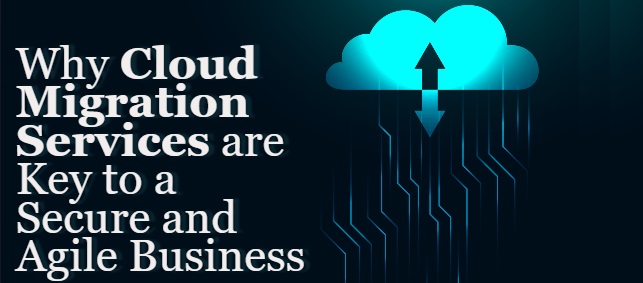Trying to juggle security and agility with traditional on-premise systems? It’s a hassle that often feels more like an uphill battle. We understand as we have made the leap from legacy systems to cloud technology. Balancing security and agility with outdated IT infrastructure and rigid desktop-based setups is a constant struggle. Simply put, these systems can’t keep up with today’s fast-paced needs. That’s where the cloud comes in. Cloud migration provides the flexibility, security, and scalability you need to stay ahead in today’s rapidly evolving digital landscape.
With Gartner projecting that over 95% of new digital workloads will deploy on cloud-native platforms by 2025, the cloud is becoming the norm for modern businesses.
At Tech Anand Rathi, we see cloud migration as more than a data move—it’s a significant part of digital transformation that leaps businesses toward success in an Internet-powered digital ecosystem. We work closely with you to create secure and seamless cloud solutions that support your business goals and pave the way for agility, efficiency, and growth in the cloud. Join us as we explore why cloud migration is crucial for creating a secure and adaptable business, and how Tech Anand Rathi can guarantee an effortless transition to the cloud.
What is Cloud Computing and What are the Major Types of Cloud Service Models?
Cloud computing is a transformative technology that’s changing how businesses and individuals manage data and access computing resources. Rather than relying on local servers or personal computers, cloud computing uses a network of remote servers hosted on the internet to store, manage, and process data. This means you no longer need to worry about maintaining physical infrastructure or dealing with hardware issues.
Cloud services come in different models that cater to various needs, as the table shows:
| Types | Description | Example |
| Infrastructure as a Service (IaaS) | Provides virtualized computing resources like storage, networks, and servers over the internet. | Amazon Web Services (AWS), Microsoft Azure |
| Platform as a Service (PaaS) | Offers a platform for developing, running, and managing applications without managing infrastructure. | Google App Engine, Microsoft Azure App Services |
| Software as a Service (SaaS) | Delivers software applications via the internet on a subscription basis, no installation required. | Google Workspace (Docs, Gmail), Microsoft Office 365 |
| Function as a Service (FaaS) | A serverless model where users run code in response to events without managing servers. | AWS Lambda, Google Cloud Functions |
| Container as a Service (CaaS) | Provides container-based services to deploy and manage applications without managing underlying infrastructure. | Google Kubernetes Engine (GKE), Amazon ECS |
| Data as a Service (DaaS) | Provides cloud-based data storage and processing for easy access and analysis without on-premise infrastructure. | Snowflake, Google BigQuery |
| Cloud Storage | Online storage services for saving and accessing data remotely via the internet. | Google Drive, Amazon S3, Dropbox |
With cloud computing, businesses can access computing resources—such as storage, processing power, and software—on-demand over the internet, rather than being tied to physical devices. This on-demand access makes cloud computing a flexible and cost-effective solution for businesses of all sizes. It eliminates the need for heavy upfront investments in hardware and allows companies to scale their resources based on real-time needs, making it a dynamic and efficient way to handle business operations.
54% of global tech and business leaders look for cloud migration service providers who help identify technology strategies to increase revenue or reduce costs.
What is Cloud Migration and What are Major Approaches to Cloud Migration?
Cloud migration involves moving your data, applications, and digital assets from traditional setups to the cloud. This groundbreaking technology is transforming how businesses operate today. With the cloud, companies gain the flexibility to adapt, advanced security to protect assets, and the ability to scale on demand. It’s no surprise that, as industries worldwide adopt digital-first strategies, cloud migration has become the essential technology of the age.
The table explores 6 major approaches to cloud migration:
| Types | Description | Example |
| Rehosting (Lift and Shift) | Moving applications and data from on-premise to the cloud without significant changes to the architecture | Migrating a database from on-premise servers to AWS EC2 with no code changes |
| Replatforming | Making minimal changes to applications during migration to optimize them for the cloud while keeping the core structure | Moving a website from on-premise servers to a managed cloud database with minor optimizations |
| Repurchasing | Replacing on-premise applications with cloud-based software (e.g., switching from legacy systems to SaaS solutions) | Switching from an in-house CRM to a cloud-based SaaS CRM like Salesforce |
| Refactoring | Rebuilding or redesigning applications to fully leverage cloud-native features for better performance and scalability | Redesigning a monolithic application as microservices to be deployed in a cloud environment |
| Retirement | Decommissioning outdated applications and systems that are no longer needed in the cloud infrastructure | Phasing out an old data storage application that is redundant after moving to a cloud-based system |
| Retaining | Keeping certain applications on-premise or in a hybrid environment due to specific business or regulatory requirements | Maintaining an on-premise system for sensitive data that cannot be stored in the cloud |
By migrating to the cloud, organizations can modernize their IT infrastructure, reduce reliance on physical hardware, and achieve greater flexibility in meeting evolving business needs. However, a successful migration requires strategic planning, careful execution, and selecting the most appropriate approach to ensure minimal disruption and maximum efficiency.
Security Benefits of Cloud Migration
In a world where data breaches make headlines daily, ensuring your sensitive information is safe during cloud migration is crucial. If you’re thinking about moving to the cloud, it’s crucial to understand how it can help protect your sensitive information. Cloud migration strengthens your security framework in key areas like encryption, compliance, and risk reduction.
Let’s take a closer look at what security benefits the cloud can bring to your digital endeavours:
1. Data Encryption for Protecting Sensitive Information
Moving to the cloud provides a significant upgrade in data security through state-of-the-art encryption technologies. When data is intercepted, it stays unreadable without the required decryption keys, thanks to the cloud’s advanced security measures. For a financial services firm, the cloud’s advanced encryption and key management systems provide a critical layer of protection against data breaches and unauthorized access.
Data encryption not only strengthens your security framework but also reduces the administrative burden of regulatory compliance. With the cloud handling your data security needs, your team can focus on driving business growth and innovation, knowing that your sensitive business information is well-protected in a secure, compliant cloud environment.
2. Compliance & Regulation for Simplified Industry Standards
Compliance with regulations is a constant challenge for industries dealing with sensitive customer data, such as healthcare and finance. Thankfully, cloud solutions are here to make the process easier and more efficient with streamlined audits, enhanced data security, and automated compliance checks.
65% of organizations are concerned about meeting compliance requirements in the cloud.
Take the example of a hospital transitioning to the cloud—it can provide the healthcare facility with over-the-internet access to superior security features for patient data with simplified compliance management. With tools designed to automatically handle many of the compliance tasks, cloud migration helps reduce the time and effort needed to prove adherence to regulations.
3. Risk Reduction for Minimizing Cybersecurity Threats
Migrating to the cloud helps minimize cybersecurity risks by offering advanced security features such as real-time monitoring, automated updates, and AI-powered threat detection. Cloud can offer robust security tools that continuously monitor and protect against potential threats, ensuring sensitive customer data is safeguarded.
For example, an e-commerce business can enhance its security posture by leveraging cloud services that provide 24/7 surveillance and immediate patching of vulnerabilities. By adopting cloud-based security solutions, a business can focus on delivering superior customer experiences, while the cloud manages and mitigates the risk of cyberattacks.
How Cloud Migration Enhances Business Agility
In today’s dynamic business landscape, adaptability is key to staying ahead. Businesses must be nimble, quick to respond to changes and resilient to unforeseen challenges. Cloud migration has emerged as a transformative solution, empowering organizations to achieve these goals.
Here’s how moving to the cloud can enhance business agility:
1. Improved Accessibility
One of the cloud’s standout benefits is accessibility. Employees can securely access company data and applications from anywhere, on any device, as long as they have an internet connection. This breaks down geographical barriers, fosters remote work, and enables faster decision-making while speeding up business operations.
2. Scalability on Demand
Growth is great, but it comes with its own challenges. The cloud offers scalability, meaning businesses can quickly adjust their computing resources—whether it’s storage or processing power—based on demand. No more investing in costly infrastructure that might sit unused during slower periods. Cloud services like AWS, Azure, and Google Cloud let businesses scale up during peak times and scale down when things quiet down, saving both time and money.
3. Faster Time to Market
In today’s market, speed is crucial. <igrating to the cloud can accelerate software development and deployment by providing powerful tools for collaboration, testing, and iteration. Whether you’re launching a new product or expanding services, the cloud speeds up the process, allowing businesses to respond to market demands faster and stay ahead of the competition.
4. Enhanced Collaboration
Cloud-based tools make it easier for teams to collaborate in real-time. Whether you’re working across different time zones or departments, cloud platforms like Google Workspace or Microsoft 365 offer seamless collaboration features. This smooth communication and team coordination boost productivity, enabling businesses to move faster and more efficiently.
5. Data and Disaster Recovery
With the cloud, your data is safe and easily recoverable. Cloud providers offer built-in disaster recovery solutions that ensure business continuity in case of unexpected disruptions. Instead of worrying about data loss or downtime, businesses can focus on what really matters—growth and innovation.
With improved accessibility, scalability, faster time to market, better collaboration, and enhanced resilience, moving to the cloud equips businesses to navigate challenges with confidence and seize opportunities faster.
Key Considerations for Successful Cloud Migration
Cloud migration is a powerful way to unlock flexibility, scalability, and cost savings. However, achieving a seamless transition to the cloud requires careful planning, strategic decision-making, and a strong focus on change management. Here are three key considerations to keep in mind to ensure a successful cloud migration journey.
1. Choosing the Right Cloud Provider: Evaluating Scalability, Security, Cost and Support
Selecting a cloud migration service provider is one of the most critical steps in the migration process. Businesses need a provider that not only meets current requirements but can also grow with their needs, offer robust security features, and provide reliable support.
Key factors to evaluate when choosing a provider include:
- Scalability: Can the provider handle increased demand and growing workloads? Look for a provider with a range of service options that allow you to scale seamlessly as your business expands.
- Security: Data security is paramount, especially in the cloud. Assess the provider’s encryption practices, security certifications, and compliance with industry standards to ensure data protection.
- Cost: Cost plays a pivotal role in transitioning from an on-premise setup to a cloud-powered platform. When choosing a cloud provider, always prioritize both cost efficiency and service quality.
- Support: Choose a provider with strong customer support options, including round-the-clock availability and a knowledgeable support team to assist during the migration and beyond.
Selecting the right cloud migration expert is crucial for a seamless migration. Prioritize scalability, security, cost efficiency, and reliable support to ensure a partner that drives growth and maximizes the benefits of cloud technology.
50% of decision-makers value a cloud provider that understands their industry and has solutions for future needs.
2. Creating a Migration Strategy: Planning for a Smooth Transition
A successful cloud migration begins with a well-defined strategy that outlines clear objectives, timelines, and resource allocation. This approach minimizes operational disruptions, addresses potential challenges proactively
Here are some essential steps for a structured migration approach:
- Assessment: Begin by assessing current applications, data, and infrastructure. Identify which applications are cloud-ready and which might need adjustments or replacements.
- Planning: Develop a comprehensive migration plan, mapping out timelines, responsible team members, and risk management measures. Decide on a migration type—whether rehosting (lift-and-shift), re-platforming, or refactoring.
- Testing: Testing is essential to ensure applications work correctly in the cloud environment. Conduct rigorous tests to verify performance, security, and data integrity before going live.
- Post-Migration Support: Once migration is complete, establish ongoing monitoring and support to identify any issues and optimize cloud performance over time.
Careful planning can prevent costly errors and ensure a smooth transition that meets both short-term and long-term business goals.
3. Ensuring Smooth Cloud Adoption with Training and Change Management
Cloud migration represents a significant change for employees accustomed to on-premise systems. Training and change management are essential to help teams adapt and make the most of the cloud’s capabilities.
- Employee Training: Ensure employees receive training on cloud operations, new workflows, and any changes in processes. Proper training builds confidence and helps staff maximize productivity in the new environment.
- Change Management: Communicate the benefits of cloud migration and keep employees informed of the changes throughout the process. Effective change management helps reduce resistance, enhances engagement, and ensures a smoother transition.
80% of companies report improved ROI within the first year of cloud adoption.
When it comes to cloud adoption, it’s not a one-and-done thing—it needs to be ongoing. Regular updates, feedback, and always having support available help keep things going smoothly during and post-cloud transition.
Final Thought
Cloud migration offers transformative benefits that boost both security and business agility. By moving to the cloud, companies gain access to enhanced data encryption, compliance support, and reduced cyber risk, ensuring a stronger security posture. Additionally, the flexibility, speed, and robust disaster recovery options provided by cloud platforms enable businesses to adapt quickly to changing demands and remain resilient in the face of disruptions.
Cloud-native technologies and AI-driven solutions further enhance operational efficiency and drive innovation, positioning businesses for long-term success. Transform outdated systems into powerful, agile solutions with Tech Anand Rathi. Our expertise in cloud migration breathes new life into legacy infrastructure, ensuring enhanced performance, security, and scalability. Take the leap towards future-ready systems with our proven strategies and seamless migration experience.
Let’s unlock your business’s full potential—reach out to Tech Anand Rathi today!



